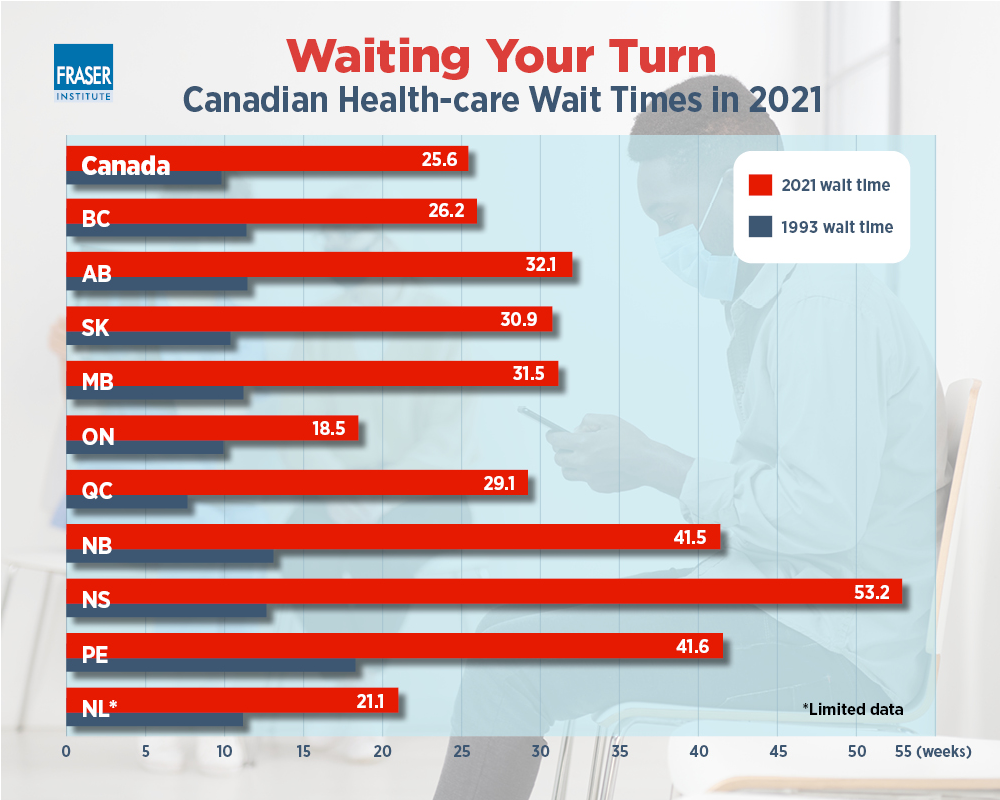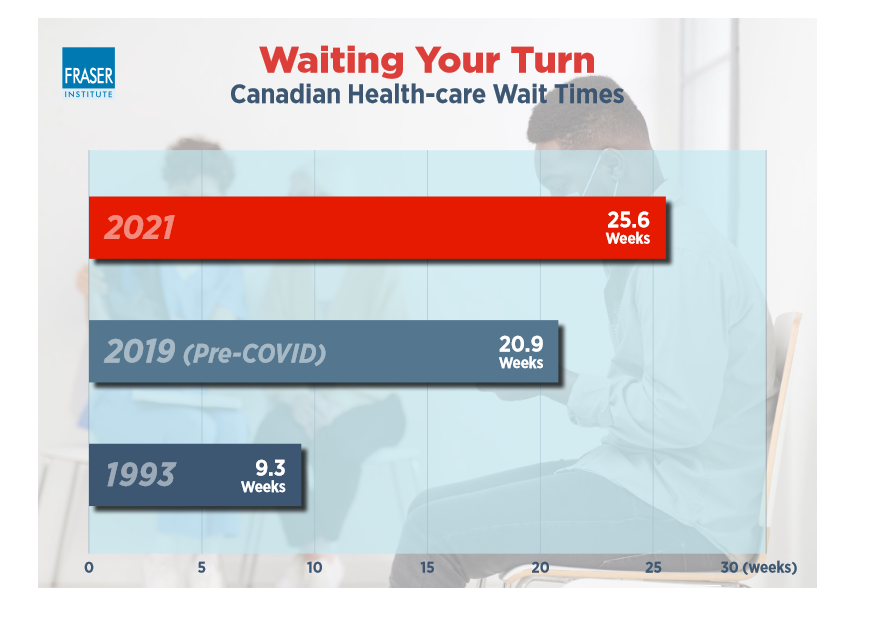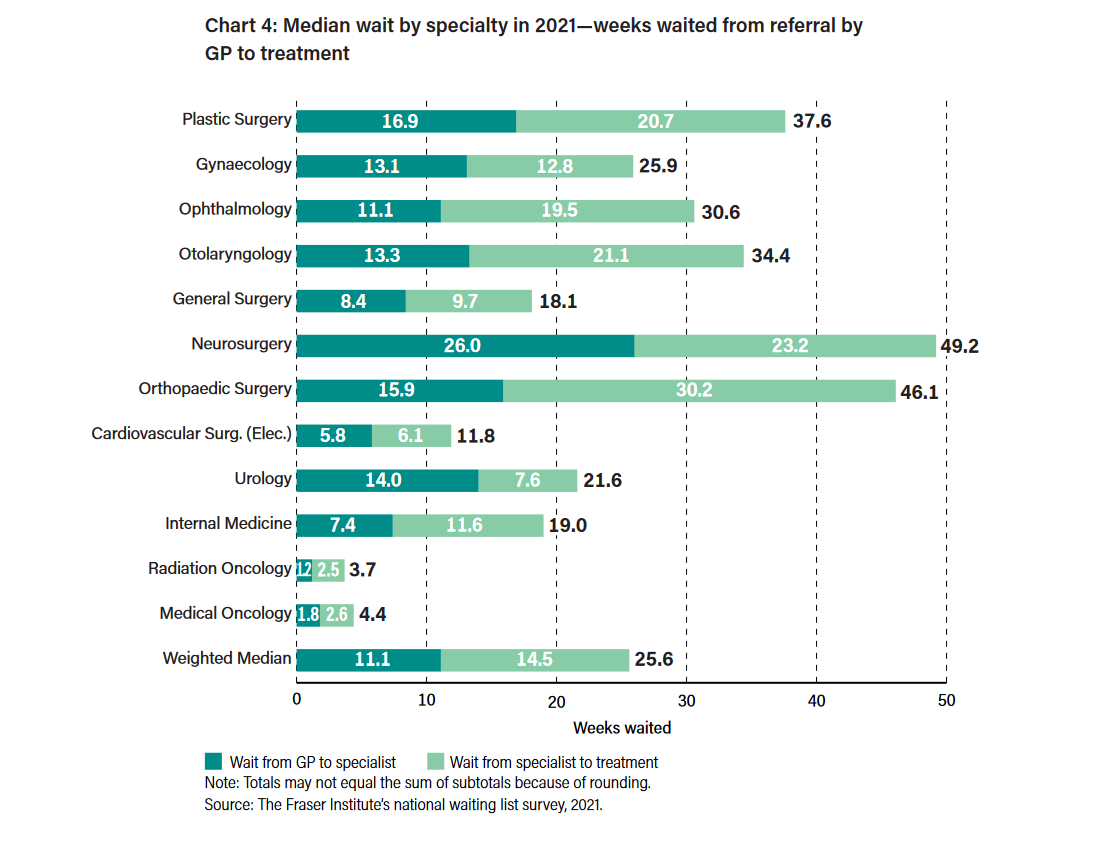Canadians are waiting longer than ever for medically necessary treatment, finds a new study released by the Fraser Institute in Dec 2021, an independent, non -partisan Canadian public policy think tank.

Fraser Institute
The median wait time for treatment in Canada for the year 2021 was 25.6 weeks, up from 20.9 weeks wait time in 2019.
Fraser Institute has been studying wait times across Canada by surveying specialist physicians across 12 specialties and 10 provinces since 1993. This year’s wait time is the longest wait time recorded in this survey’s history and is 175% longer than in 1993, when it was just 9.3 weeks.
Fraser Institute collected data for the study between January 15, 2021 and July 27, 2021, and the response rate was 9% (more than 1,100 responses), a lower response rate than in previous years.
The report, Waiting Your Turn, finds COVID-19 and related hospital closures have exacerbated wait times, but are not the cause of these historically long wait times.

Fraser Institute
“The results of this year’s survey suggest that COVID-19 and related hospital closures have exacerbated, but are not the cause of Canada’s historic wait times challenges,” said Bacchus Barua, director of the Fraser Institute’s Centre for Health Policy Studies and co-author of the study. “Results from the same survey reveal that patients waited an estimated 20.9 weeks for medically necessary elective care in 2019—long before the pandemic started”
Ontario recorded the shortest wait time at 18.5 weeks—still up from 17.4 weeks in 2020. Nova Scotia recorded the longest wait time in Canada at 53.2 weeks. Newfoundland & Labrador came in as the second shortest provincial wait time in Canada at 21.1 weeks. Regarding the wait times in Newfoundland and Labrador, Fraser Institute says to interpret the result with caution due to a lack of data for certain specialties.
The report splits the wait times into two parts – referral by a general practitioner to consultation with a specialist and from the consultation with a specialist to the point at which the patient receives treatment.
In Ontario, patients waited an average of 8.2 weeks to see a specialist after being referred to by a family doctor and then another 10.3 weeks for treatment. While in Nova Scotia, they had to wait 19 months to see a specialist and 34.1 weeks for treatment.
The longest wait times to see a specialist after referral by a family doctor are in Prince Edward Island at 24.1 weeks.

Fraser Institute
The average wait times for actual treatment after seeing a specialist increased to 14.5 weeks this year. Physicians say their patients are waiting six weeks longer for treatment (after seeing a specialist) than what they consider to be clinically reasonable.
Surgery wait times: Among the various specialties, national wait times were longest between a referral by a GP referral and neurosurgical procedures (49.2 weeks) and shortest for radiation
treatments (3.7 weeks). The interval from consultation with a specialist to the point at which the patient receives treatment is shortest for urgent cardiovascular surgery (1.4 weeks), radiation oncology (2.5 weeks), and medical oncology (2.6 weeks). The longest wait time is for orthopedic surgery (30.2 weeks), neurosurgery (23.2 weeks) and otolaryngology (21.1 weeks).

Fraser Institute
Diagnostic technologies wait times: Canadians are also experiencing significant waiting times for various diagnostic technologies across the provinces with an expected wait time of 5.2 weeks for a computed tomography (CT) scan, 10.2 weeks for a magnetic resonance imaging (MRI) scan, and 3.6 weeks for an ultrasound.
Fraser Institute report estimates that across the 10 provinces, the total number of procedures for which people are waiting in 2021 is 1,425,517. This means that assuming that each person waits for only one procedure, 3.7% of Canadians are waiting for treatment in 2021. The report also says about 14.4% of their patients are on a waiting list because they requested a delay or postponement.
“Long wait times aren’t simply minor inconveniences, they can result in increased suffering for patients, lost productivity at work, a decreased quality of life, and in the worst cases, disability or death,” said Mackenzie Moir, Fraser Institute policy analyst and study co-author.
A recent study – Comparing Performance of Universal Health Care Countries, 2021 – by Fraser Institute also found that Canada ranks very low among 28 developed countries with Universal Health Care despite spending more on health care than most other developed countries.
A detailed report is given here — Waiting Your Turn: Wait Times for Health Care in Canada, 2021 Report.







